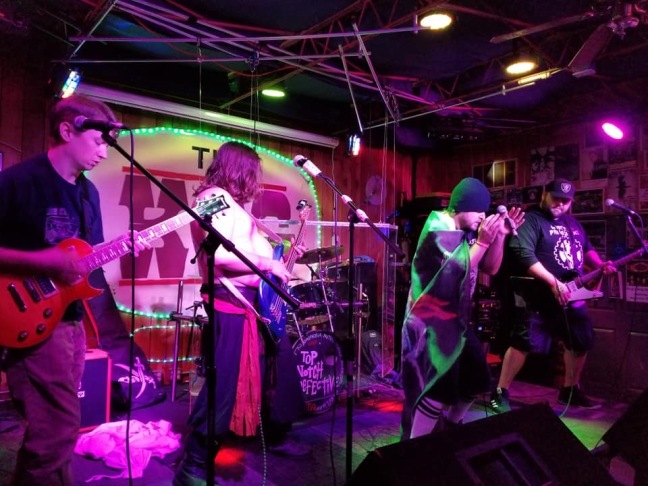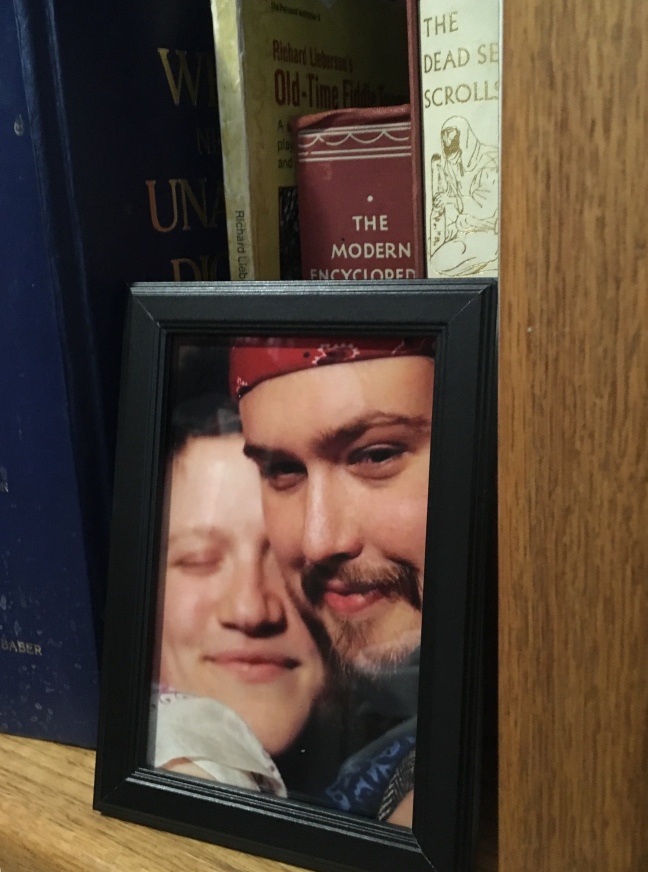The opposite of love is not hate, but indifference.
– Elie Wiesel

This year has seen many changes in our life. New jobs, new music (Caz and I are musicians), new friends made, and old friendships rekindled. The most notable change in my life has been the stabilization of my bipolar cycle.
In the fall of 2017 I joined a punk rock band called Top-Notch Defective, and also started a new job. The preceding summer had been one of the worst times in my life. That spring was the last time I had been in manic delusion. I will not go into what that is like here, but the upshot is that my g.p. prescribed a mild antidepressant designed to bring me down. It worked, I came out of mania and delusion, and was able to get a job as a janitor. The only problem was that it put me into the worst depression I have ever experienced.
Before this experience, depression had been an element of my bipolar cycles, but not long lasting, and while difficult, not crippling. This depression was crippling. My desire to live was gone – not replaced with a desire to die, but with indifference. As my lead guitarist referring to medication induced depression put it: my spark was gone.
As a spouse my spark is that which keeps the romance alive. As a parent my spark prompts me to play with my little ones, it can ignite their imaginations and broaden their minds. As an artist my spark not only drives me to create, but is, along with those I love, my reason to live. That was gone. I was an empty husk, listlessly blown by the breezes and gales of daily life. Uncaring. Unfeeling. A dead man walking.
My brother called me in the fall of 2017 saying that the bassist for his band had resigned, and asking me to try out. I didn’t want to. I didn’t want another “have to” in my life. Having to get out of bed was hard enough let alone mustering the will or interest to play music. But at the urging of Greg and my wife I tried out. Long story short I got along with the guys from Top Notch Defective, and joined the band as a green and mediocre bassist (I’m no longer green at least) with zero experience playing punk rock.

By the end of December I was working a new job, and life was looking up, but I was still completely empty.
Let me back up. I stopped taking that new medication over the summer. I was only on it for a few months (4 or 5), but the loss of any interest in life freaked me out so much that I weened myself off of it. The depression continued. No manias, no cycles, no nothing. Just emptiness. The band was work. My job was drudgery. My spouse and children were just humans I had a duty too care for. Even hosting my radio show on KZUM was empty work that I began to phone in.
Slowly the depression began to lift. As if a series of curtains that blocked me from living were being removed from my senses and emotions one by one. Slowly. We moved to a new house. Caz got a new job. The band started to get better and we played more shows. In short as life normalized, my depression faded.

While I can’t “fix” the chemicals or brain malformation that make me bipolar, I have come to rely on two new environmental elements to regulate my cycles: art and friendship. While there are many other environmental factors that effect the manias and depressions that are the bane of those of us struggling with bipolar disorder, factors like family circumstances, sleep, medications, diet and exercise, I had little idea up to this year how important friendship and art are.
My closest friend moved to Indiana in early 2017 leaving a gaping human shaped hole in my life. I stopped playing music when my depression started. While I am friends with my spouse, male and female friendships outside of our marriage are very important. And I’m an extrovert. Yes I’m outgoing and can be gregarious, but that’s not what defines extroversion for me. In the Jungian sense being an extrovert means that I derive energy from other people. Being an artist and intellectually inclined means that my favorite types of people to be around are either philosophically minded, or artists or both. This year has exposed me to a number of local musicians who like me are artists. They are writers, or painters. They work with their hands and minds and senses to create, express, and interpret. My people.
Slowly but surely I have built new friendships, rekindled old ones, and become part of an incredibly diverse community of artists from a glass fuser, and a podcaster, to bass players and a PHD candidate composer, a talkative blacksmith, and a Jedi master Viking weaver (seriously).

I’ve also rekindled my love of religious studies. I’m reading again – thanks by the way to my friend Gordon for such a wonderful Christmas present: More Than Belief: A Materialist Theory of Religion by Manuel A. Vasquez, it’s so cool. Randy, another friend gave me his complete set of Early Church Fathers, ALL 38 VOLUMES!!! I’ve wanted it ever since my early teens. That actually says a lot about me in my teen years. When my friends were lusting after a new skateboard or their first car, I wanted 38 volumes of early christian religious texts on theology and mysticism…and the skateboard.
Finding musicians that I can communicate with artistically is so incredibly important for my mental health. When mania pushes me into a creative fervor I now have a communal outlet for that. A musician with whom I have a couple of other musical projects has bipolar disorder as well. What a hoot when we both cycle into mania and get all creative. So much fun. Another friend has hyperfocused autism, and we can sit and chat for hours about music. We actually have play dates with our kids.
When my depression cycle starts, my friendships have pulled me through. The love and support of my brothers (and their significant others) in Top Notch Defective has been such a boon to my mental health. To paraphrase Tiny, our rhythm guitarist, “We don’t just like to play, we NEED to play!”
Cheers to Jimmy, Steve, Tiny and Hanna, and Jason, Troy and Jen, Jericho, Paul, Fasti and The Barony and all my new SCA friends, also Evert, David, Colin, and, my new friends Mark and Randy from PolyFaze, and to others too many to mention here. Your comradery and inspiration have not only brought me joy, but have been an important stabilizing force in the tempest tossed world that I live in inside my brain.

I’m gushing. I’ll stop.
Cheers and a massive thank you to my parents, and my brother (also fantastic former TND frontman) and his girlfriend, for supporting and helping us along this road to stabilization. The Dank clan cares for one another. We are proof of that.
Most importantly, Merry Christmas to my partner in both crime and crazy, the incomparable Caz, my Bonnie Lass. Ten Years of marriage in 2019! Also since Elliot, Joey, Anna, and Rose (my children) may one day read these posts, know this: I love you more deeply than can be fathomed, more completely every day, and more truly than even my own life.
Here’s to you all in 2018 and here’s to us all in 2019!
May we get what we want, May we get what we need, But may we never get what we deserve.
With Love
Samuel James “Little” Dank

P.S. my editor (Caz) is exhausted from being awesome and needs to sleep. So the spelling grammar and poor stylistic choices are entirely my fault. Beg pardon.













